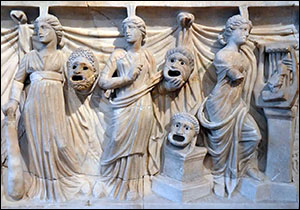|
|
|
|
 Samuel Daniel Samuel Daniel

Photo: Carole Raddato, CC BY-SA 2.0.


| |
[ACT IV]
CHORVS.
Mysterious Egypt, wonder breeder,
strict Religions strange observer,
State-orderer zeal, the best rule-keeper,
fostering still in temperate fervor
O how cam'st thou to lose so wholly
all religion, law and order?
And thus become the most unholy
of all Lands, that Nilus border ?
How could confus'd Disorder enter
where stern Law sate so severely?
How durst weak lust and riot venter
th'eye of Justice looking nearly?
Could not those means that made thee great
Be still the means to keep thy state?
Ah no, the course of things requireth
change and alteration ever
That same continuance man desireth,
th'unconstant world yieldeth never.
We in our counsels must be blinded,
and not see what doth import us:
And oftentimes the things least minded
is the thing that most must hurt us.
Yet they that have the stern in guiding,
'tis their fault that should prevent it;
For oft they seeing their Country sliding,
take their ease, as though contented.
We imitate the greater powers,
The Princes' manners fashion ours.
Th'example of their light regarding,
vulgar looseness much incenses:
Vice uncontrolled, grows wide enlarging,
Kings' small faults be great offences,
And this hath set the window open
unto license, lust, and riot:
This way confusion first found broken,
whereby entered our disquiet.
Those laws that old Sesostris founded,
and the Ptolomies observed,
Hereby first came to be confounded,
which our state so long preserved.
The wanton luxury of Court,
Did form the people of like sort.
For all (respecting private pleasure,)
universally consenting
To abuse their time, their treasure,
in their own delights contenting:
And future dangers naught respecting,
whereby, (O how easy matter
Made this so general neglecting,
confus'd weakness to discatter?)
Caesar found th'effect true tried,
in his easy entrance making:
Who at the sight of arms, descried
all our people, all forsaking.
For riot (worse than war) so sore
Had wasted all our strength before.
And thus is Egypt servile rendered
to the insolent destroyer:
And all their sumptuous treasure tendered,
all her wealth that did betray her.
Which poison (O if heaven be rightful)
may so far infect their senses,
That Egypt's pleasure so delightful,
may breed them the like offences.
And Romans learn our way of weakness,
be instructed in our vices,
That our spoils may spoil your greatness,
overcome with our devices.
Fill full your hands, and carry home,
Enough from us to ruin Rome.
|
1210
1220
1230
1240
1250
1260
1270
|
|
Transcribed and modernized by Anniina Jokinen from
Daniel, Samuel. The Complete Works in Verse and Prose of Samuel Daniel. vol 3.
A. B. Grosart, ed. New York: Rusell & Russell, Inc., 1885, Reissued in 1963. 75-77.
 |
to Works of Samuel Daniel |
Site copyright ©1996-2023 Anniina
Jokinen. All Rights Reserved.
Created by Anniina Jokinen
on June 4, 1997. Last updated on May 16, 2023.
|
|
The Tudors
King Henry VII
Elizabeth of York
King Henry VIII
Queen Catherine of Aragon
Queen Anne Boleyn
Queen Jane Seymour
Queen Anne of Cleves
Queen Catherine Howard
Queen Katherine Parr
King Edward VI
Lady Jane Grey
Queen Mary I
Queen Elizabeth I
Renaissance English Writers
Bishop John Fisher
William Tyndale
Sir Thomas More
John Heywood
Thomas Sackville
John Bale
Nicholas Udall
John Skelton
Sir Thomas Wyatt
Henry Howard
Hugh Latimer
Thomas Cranmer
Roger Ascham
Sir Thomas Hoby
John Foxe
George Gascoigne
John Lyly
Thomas Nashe
Sir Philip Sidney
Edmund Spenser
Richard Hooker
Robert Southwell
Robert Greene
George Peele
Thomas Kyd
Edward de Vere
Christopher Marlowe
Anthony Munday
Sir Walter Ralegh
Thomas Hariot
Thomas Campion
Mary Sidney Herbert
Sir John Davies
Samuel Daniel
Michael Drayton
Fulke Greville
Emilia Lanyer
William Shakespeare
Persons of Interest
Visit Encyclopedia
Historical Events
Field of the Cloth of Gold, 1520
Pilgrimage of Grace, 1536
The Babington Plot, 1586
The Spanish Armada, 1588
Elizabethan Theatre
See section
English Renaissance Drama
Images of London:
London in the time of Henry VII. MS. Roy. 16 F. ii.
London, 1510, the earliest view in print
Map of England from Saxton's Descriptio Angliae, 1579
Location Map of Elizabethan London
Plan of the Bankside, Southwark, in Shakespeare's time
Detail of Norden's Map of the Bankside, 1593
Bull and Bear Baiting Rings from the Agas Map (1569-1590, pub. 1631)
Sketch of the Swan Theatre, c. 1596
Westminster in the Seventeenth Century, by Hollar
Visscher's Panoramic View of London, 1616. COLOR
|
|